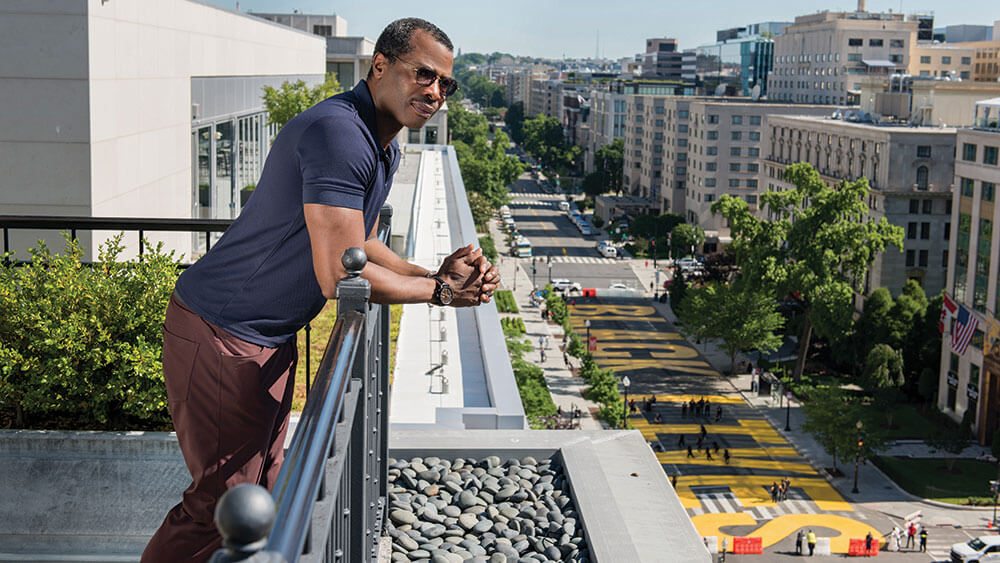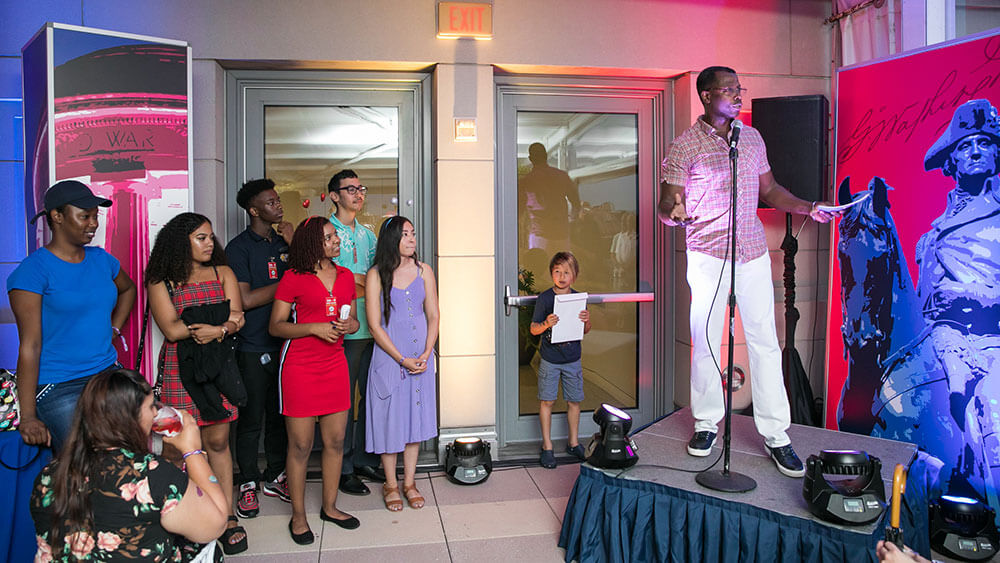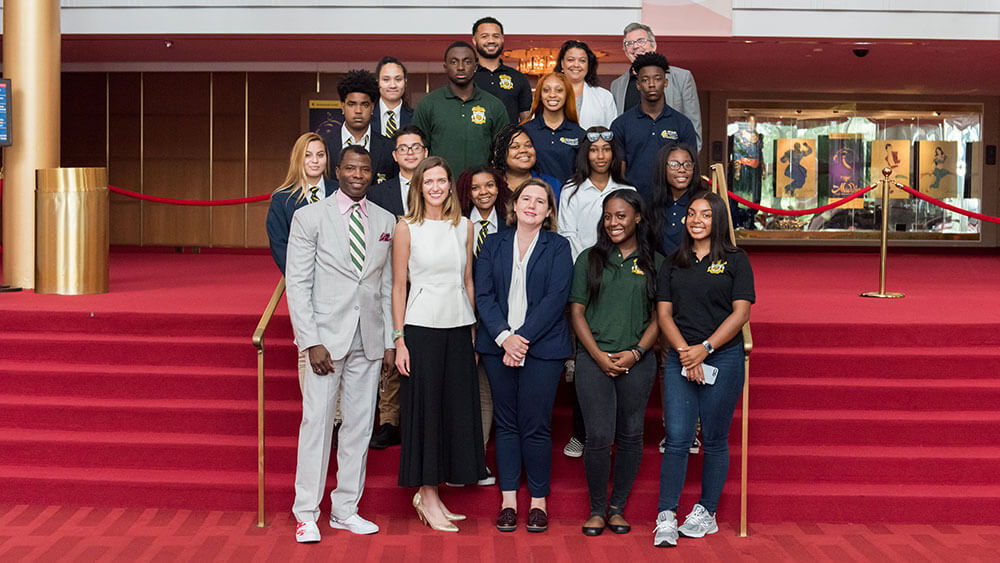
Elliott Ferguson, president and CEO of Destination DC, looks out over Black Lives Matter Plaza in the United States capital. (Courtesy washington.org)
Editor’s Note: PCMA Groundbreakers is a new initiative honoring industry trailblazers who represent diverse sectors of the business events community, recognizing those who have made a significant contribution to their organizations and programs that advance inclusion and equity. Conceived by PCMA’s Black Lives Matter Working Group, the honor helps to create a living history of pioneers in the business events industry.
This year, from his office windows that overlook 7th and I streets in Washington, D.C., Elliott Ferguson, president and CEO of Destination DC, watched on Jan. 6 as rioters made their way back from the Capitol to their hotels. It was not the first time that Ferguson had a front-row seat to a historic national event. The insurrection was among many crises Ferguson and his team have navigated in their work over the past 20 years — the aftermath of 9/11, anthrax scares, the sniper attacks of 2002, multiple government shutdowns, and the social unrest and pandemic of 2020 among them.
Now, as the business events industry inches toward recovery, Ferguson is addressing a long-standing challenge with a new initiative — leading a frank and much-needed conversation about the lack of diversity among leaders in the travel and meetings industry. In February, he helped launch Tourism Diversity Matters (TDM), serving as its first chairman of the board. And in December 2021, he will celebrate 20 years at Destination DC, an organization he has led as president and CEO since 2009.
Following the announcement of that initiative, Convene caught up with Ferguson, who opened up about the challenges he has faced as a Black man chasing his ambitions, why DMOs need to listen to their communities now more than ever, and how he learned you should never settle for someone else’s expectations of you.

Elliott Ferguson speaks at a fundraiser for the American Experience Foundation (AEF). AEF provides DC-area young people with trips, scholarships, and internships in an effort to build the next generation of hospitality professionals. (Jason Dixon Photography)
‘Wake up and Move on’
Born on the West Coast, Ferguson came of age in Savannah, Georgia, graduating from Savannah State University and kicking off his career in 1989 as director of sales at the Savannah Convention and Visitors Bureau — the first person of color the CVB had ever hired in management.
“Being Black and working in that environment and working with people that just did not know how to manage me managing them, especially if they were older, that really set the stage for me to learn more about dealing with people who might not respect who you are simply because of the color of your skin,” Ferguson said. Back then, working in a Southern city like Savannah came with “a lot of interesting dynamics,” he said. There were the “blue bloods of downtown, and then there was the rest of the city. You go outside of that area and it’s totally different.”
Ferguson said that even though his experience working at the Savannah CVB was mostly positive, he just couldn’t foresee a path forward in a place that felt behind the times. “You almost had to wait for [the old guard] to die out in Georgia, because they’re not going to change,” he said. “Unfortunately, that was the only way you would really see change. And that was kind of the way we saw it.”
After a few years, he moved on to the Atlanta CVB. In that more progressive setting, he hit his stride, becoming vice president of sales and “learning a lot about leadership — and myself.”
Although his 10-year run in Atlanta was full of “great experiences” and “amazing people,” Ferguson said he felt “that every opportunity that I had in Atlanta, I deserved and I earned. However, to a certain extent it was managed, where there was this sense of, ‘This is as far as you’re going to get.’”
RELATED: 5 Questions About Race — Asked and Answered by Black Tourism Professionals
Still, Ferguson said, “I learned a lot about myself in terms of … not to ever accept a ceiling that someone else might create for you.” And when 9/11 happened, something stirred in him.
“I started thinking about how many times I accepted what I was told and did not look at it through the lens of, ‘I don’t accept this and therefore I’m not going to stay,’” said Ferguson, a veteran who served in the Air National Guard. “But after 9/11, my wake-up [call] was, ‘I’m not going to accept this and I’m going to leave.’”
That next week, he received a call from Destination DC — “on my short list of places I would move,” he said, chuckling, — to join the bureau as vice president of convention sales.
“I’ll never forget what I was told by someone, a senior-level person at the Atlanta CVB, which really solidified why I made the right decision and why I really woke up. And the comment was: ‘But Elliott, you bought a house.’”
Ferguson had bought and been living in a house in the Atlanta area — for almost a decade. “The way I interpreted it is that, ‘You’re doing really well … based on your community. Why would you want to mess up a good thing? You own this house?’ And my reaction was … ‘Well, actually, I didn’t just buy a house — I bought a house nine years ago. And, like you, if I bought a house on Monday and decided to sell it on Wednesday, I can still do that as well.’”
That conversation, Ferguson said, “solidified the mentality of the environment that I was in, and the recognition that they only saw me going up to a certain level. I had a lot of amazing experiences in Atlanta, but I made the right decision to really wake up and move on.”
You have to have a thick skin if you’re going to lead an organization, but you also have to be smart enough to know that perhaps you need to change. And some of my peers will die on a sword defending how inclusive they are.”
‘You’ve Got to Create Those Opportunities’
Two decades later, Ferguson is now at the helm of Destination DC. In the past 20 years, he has led the organization through a decade of record tourism growth and playing host to countless high-profile events, from the U.S. Travel Association’s first-ever IPW in D.C. to President Obama’s historic first inauguration. He also helped start the American Experience Foundation, which exposes students to the hospitality industry and opens their eyes to the possibility of a career in tourism.
But 2020, he said, has been another wake-up call for “not dealing with some of the issues” that he had experienced “moving up the ladder.”
He said that he is intent on “becoming more vocal, talking to my peers …on things … we have experienced within this industry, and being more thoughtful and more vocal about changes that need to happen.” That push is taking shape through Tourism Diversity Matters, which aims to foster equity and diversity among leadership in the tourism and events industry, among other goals. One of the ways TDM is encouraging that shift is through an apprenticeship program for ethnically diverse young people that guarantees them a job after 600 hours of experience.
RELATED: Focusing on Diversity, Equity, and Inclusion in Travel and Events
“If you’re really looking at making a change, you’ve got to make sure that, [for] those who might be disenfranchised from the industry because they don’t see opportunities, you’ve got to create those opportunities,” Ferguson said. He emphasized that programs like this have the win-win benefit of catching the eye of talented young people who initially may be drawn to other possibilities, as well as laying a foundation for a new, more diverse generation to lead the industry.
“Hospitality is a diverse industry. The problem is, most of the diversity, if you’re looking at the triangle, is at the lower levels of the triangle,” Ferguson said. “Most don’t see opportunities to grow or to build within that triangle. So therefore, at the second or third rung of the triangle, they leave the industry. We’ve got to show them commitment. We’ve got to show them opportunities.
“The inverse of that is to make sure that the industry understands that you’re not doing them a favor,” Ferguson continued. “This is what we should be focusing on. Organizations that are the most profitable are those that have diversity as a priority. You’re going to have different aspects, different trains of thought when you have a diverse group of people working with and for you, and that can lend and lead to greater profits.”
When asked about who has inspired him along the way, Ferguson is quick to first point to his family. As for those in the industry he looks up to, he names Melvin Tennant, president and CEO of Meet Minneapolis, as one of “those who really were change agents within the DMO world,” he said. “I’m inspired by those who really try to make a difference.”

Elliott Ferguson (first row, far left) with Academy of Hospitality and Tourism high school students.
‘Listen to the Community’
Recent social justice movements have put destinations under a spotlight this past year, and the lack of diversity in DMO leadership teams became more glaringly obvious. Local communities have responded by pushing for change in who is representing them as well as how the story of their destination is being told.
When I asked Ferguson how DMO leaders can become agents of change, Ferguson emphasized the importance of making sure that all of the voices that make up their destination are not only heard, but equitably represented in leadership roles.
“You’ve got to listen to the community. You’ve got to listen to what’s being said — you don’t necessarily have to agree 100 percent, because everyone is going to poke holes in everything you do . . . but sometimes you’ve got to pay attention to what what’s bubbling up,” Ferguson said. “And if your staff is not diverse, and if you’re making decisions to promote the Black community, the Latin community . . . and you don’t have that person on staff to help with that, you’re shooting yourself in the foot.”
When asked how white people, in general, can be better allies, he pointed to the letter he and 20 other Black DMO executives wrote last summer, in which they outlined several questions for everyone to consider as a starting point for a constructive conversation on race.
“I think that the challenge for white people, or for anyone who is managing or focusing on things that they’re not familiar with, is that you’re going to have to undress, be a part of the conversation, recognize what your role was as it pertains to . . . being complacent or [having] white privilege, have these conversations in a way where you’re truly understanding and engaging versus shutting it out and marginalizing the conversation,” Ferguson said.
He pointed out that it’s not necessarily about white people atoning for the acts of those who came before them — “the point is to recognize how America was built. The point is to recognize what happened after slavery, what happened after Jim Crow, and how Black people remained oppressed — all of these things that are tied to why there are so many systemic issues within the Black community,” he said.
“And you’re not at fault per se, but instead of just turning a blind eye . . . if you’re not having those conversations, if you’re not engaged, if you’re not listening, if you’re not willing to take responsibility for perhaps some of the things you were taught, some of your own bias — we all have bias — then you’re probably not going to reach the audience that you want.”
I want people to understand that … you assume that [what happened to George Floyd] can’t happen to me, but let me tell you, it could.”
That audience, he goes on to say, includes not only members and stakeholders but a DMO’s employees, c-suite, and board of directors. Talking openly, he emphasized, is what works. He reinforced that statement with a story of a recent “win” after he had a similar conversation with a group of white male leaders.
“I challenged them to go home and have this conversation with their families, and one of them called me a couple of days later, very upset because . . . his family said, ‘Oh yeah, Dad, you are racist.’ And he was shocked. And his kids, [who] are Millennials or Gen Z, they were like, ‘Yeah, you say a lot of things that aren’t right. We just figured you’re not going to change. And we just ignored you.’
“But . . . he actually did what I suggested . . . he didn’t even know that his own family saw his views as sexist and racist. Sometimes we live in our own world, and we need to be called out. And then when you become CEO or leader, it’s a sign of weakness to not know something or to show weakness.”
Ferguson emphasized that it’s this willingness to look at our own uncomfortable truths where progress is truly made — and that it’s not a person of color’s responsibility to make that process easier. He recounted an incident when he received an award at a major industry event. As he walked offstage back toward his table, someone stopped him — assuming Ferguson was a waiter, they asked him for a glass of wine.
“My first reaction, outside of being shocked, was to make the people around me feel comfortable because they were all outraged and shocked,” said Ferguson. “And I still have my award in my hand. My wife was there. And I’m looking around the room — I don’t see a Black server anywhere.
“We try so hard to make everybody else feel comfortable and make them not think it’s a big deal. [But] these stories need to be told.”
Jennifer N. Dienst is managing editor of Convene.
